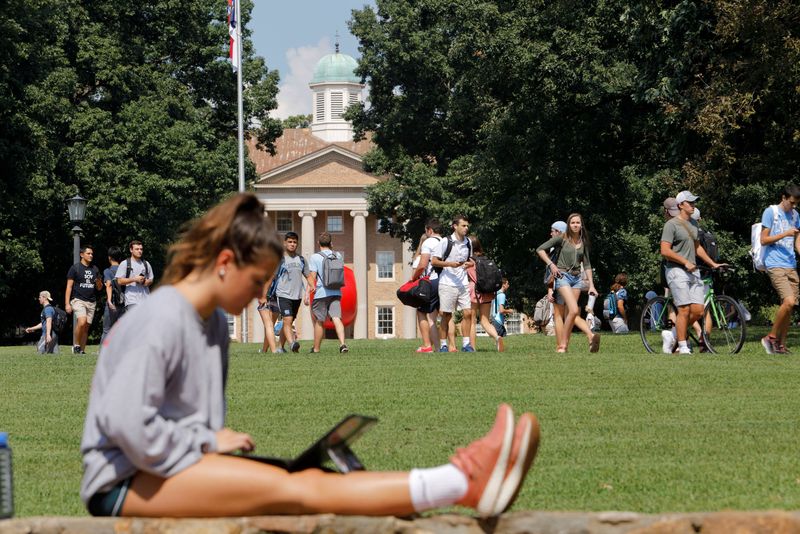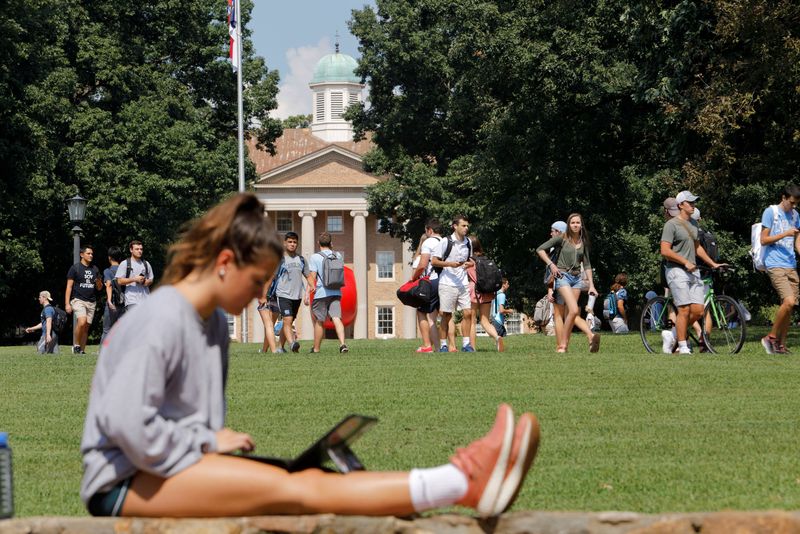Stock Markets
What the Supreme Court’s ruling on affirmative action means for colleges


© Reuters. FILE PHOTO: Students walk through the campus of the University of North Carolina at Chapel Hill, North Carolina, U.S., September 20, 2018. Picture taken on September 20, 2018. REUTERS/Jonathan Drake/File Photo
By Joseph Ax
(Reuters) – The U.S. Supreme Court on Thursday struck down race-conscious policies in college admissions, ending decades of precedent that had allowed schools nationwide to use such programs to increase the diversity of their student bodies.
Here is an explanation of the policies commonly known as affirmative action, their history and the possible consequences of the court’s decision.
WHAT IS AFFIRMATIVE ACTION?
In the context of higher education, affirmative action typically refers to admissions policies aimed at increasing the number of Black, Hispanic and other minority students on campus.
Colleges and universities that take race into consideration have said they do so as part of a holistic approach that reviews every aspect of an application, including grades, test scores and extracurricular activities.
The goal of race-conscious admissions policies is to increase student diversity in order to enhance the educational experience for all students. Schools also employ recruitment programs and scholarship opportunities intended to boost diversity, but the Supreme Court litigation was focused on admissions.
WHICH SCHOOLS CONSIDER RACE?
While many schools do not disclose details about their admissions processes, taking race into account is more common among selective schools that turn down most of their applicants.
In a 2019 survey by the National Association for College Admission Counseling, about a quarter of schools said race had a “considerable” or “moderate” influence on admissions, while more than half reported that race played no role whatsoever.
Nine states have banned the use of race in admissions policies at public colleges and universities: Arizona, California, Florida, Idaho, Michigan, Nebraska, New Hampshire, Oklahoma and Washington.
WHAT IS THE CURRENT LITIGATION ABOUT?
The Supreme Court decided two cases brought by Students for Fair Admissions, a group headed by Edward Blum, a conservative legal strategist who has spent years fighting affirmative action.
One case contended that Harvard’s admissions policy unlawfully discriminates against Asian American applicants. The other asserted that the University of North Carolina unlawfully discriminates against white and Asian American applicants.
The schools rejected those claims, saying race is determinative in only a small number of cases and that barring the practice would result in a significant drop in the number of minority students on campus.
HOW HAS THE SUPREME COURT RULED IN THE PAST?
Before Thursday, the court had largely upheld race-conscious admissions for decades, though not without limits.
A divided Supreme Court took up the issue in the landmark 1978 case, Regents of the University of California v. Bakke, after schools began using affirmative action in response to the Civil Rights era to correct the effects of racial segregation.
The swing vote, Justice Lewis Powell, ruled that schools could not use affirmative action to rectify past racial discrimination and struck down the university’s practice of setting aside a certain number of spots for minorities.
Nevertheless, Powell found that increasing campus diversity was a “compelling interest” because students of all races – not just minorities – would receive a better education if exposed to different viewpoints. Powell ruled that schools could weigh race in admissions as long as it remained only one factor among many.
In 2003, the court struck down the University of Michigan’s use of a system that awarded “points” to minority applicants as going too far, but affirmed Bakke’s central finding that schools could use race as one of several admission factors.
The court in 2016 again upheld race-conscious admissions in a challenge backed by Blum to University of Texas policies. But the court has moved sharply to the right since then, with six conservative justices now and only three liberals.
WHAT WILL COLLEGES DO IN RESPONSE?
The decision on Thursday will force elite colleges and universities to revamp their policies and search for new ways to ensure diversity in their student populations. Many schools have said other measures would not be as effective, resulting in fewer minority students on campuses.
In briefs filed with the Supreme Court, the University of California and the University of Michigan – top public college systems from states that have outlawed race-conscious admissions – said they have spent hundreds of millions of dollars on alternative programs intended to improve diversity, but that those efforts have fallen far short of goals.
Stock Markets
Suburban Propane director Logan sells $139k in shares
Stock Markets
Stock market today: S&P 500 closes lower, but posts big weekly win
Stock Markets
TD Bank promotes Laura Nitti to retail market president role

 Forex3 years ago
Forex3 years agoForex Today: the dollar is gaining strength amid gloomy sentiment at the start of the Fed’s week

 Forex3 years ago
Forex3 years agoUnbiased review of Pocket Option broker

 Forex3 years ago
Forex3 years agoDollar to pound sterling exchange rate today: Pound plummeted to its lowest since 1985

 Forex3 years ago
Forex3 years agoHow is the Australian dollar doing today?

 Cryptocurrency3 years ago
Cryptocurrency3 years agoWhat happened in the crypto market – current events today

 World3 years ago
World3 years agoWhy are modern video games an art form?

 Commodities3 years ago
Commodities3 years agoCopper continues to fall in price on expectations of lower demand in China

 Economy3 years ago
Economy3 years agoCrude oil tankers double in price due to EU anti-Russian sanctions























